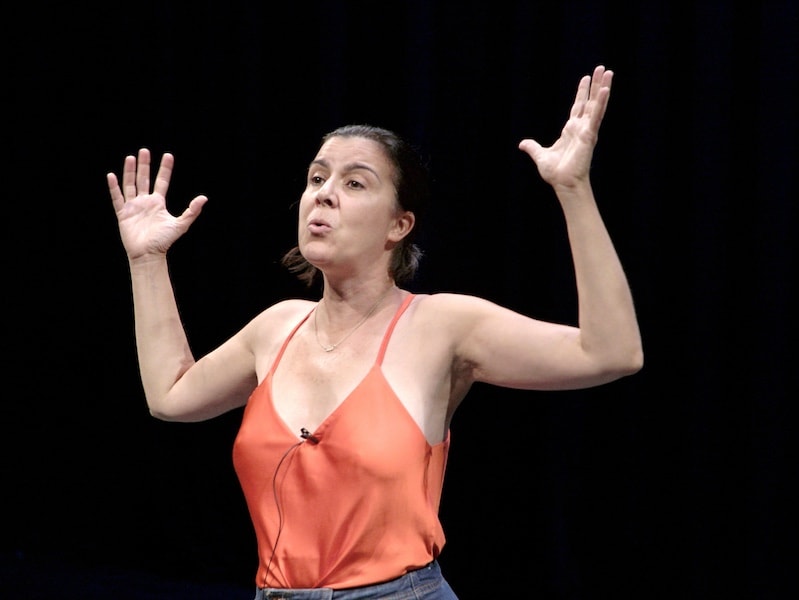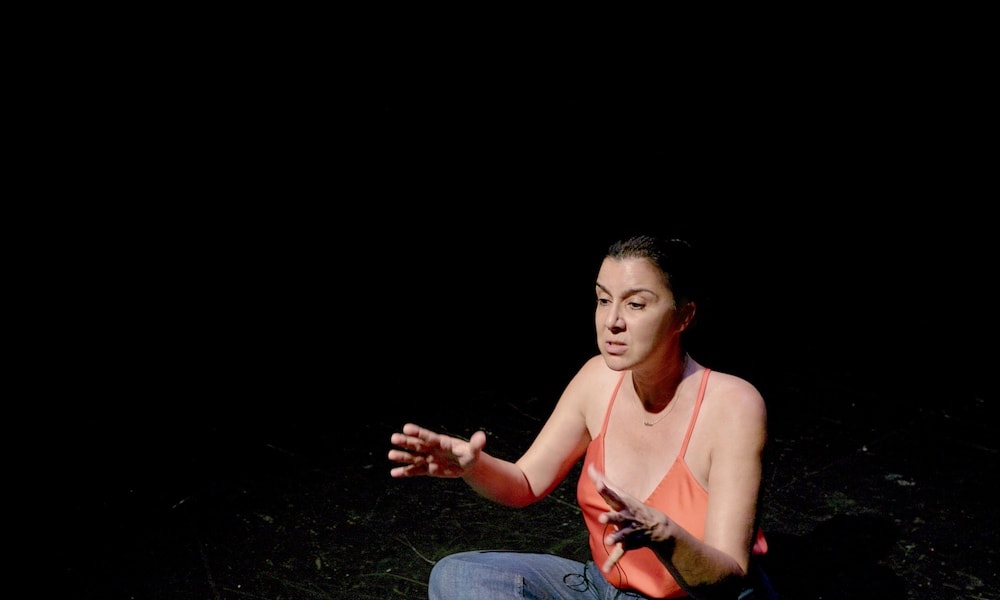When Iris Bahr first came onstage and began talking, her speech felt so informal that I assumed it was a precursor to the actual show, some kind of prologue to set the scene. She spoke to us directly, not like she was performing or giving a speech, but rather like she was regaling her friends at a dinner table. I realized soon that, in fact, the play had begun the moment Bahr stepped onstage.
That casual, conversational tone actually makes up almost all of See You Tomorrow, a new solo show, which Bahr also wrote and directed, the first in a series of three solo shows performing at Theater J that explore issues of identity and family.

Now performing through November 22, See You Tomorrow is an intimate story about family and grief that, when it plays to its strengths, finds the humor in life’s most serious moments and the poignancy in life’s most comical.
See You Tomorrow is the story of how Bahr watched, while video chatting with her mother in February 2022, as her mother had a stroke. Since her mother lives in Israel, Bahr had to find someone there to call an ambulance, before flying to Israel herself a few days later to take care of her. She guides her mother through rehab as she recovers physically, only to find out the stroke resulted in dementia, and then stretches herself thin trying to be a caregiver in the following months.
Bahr recounts her experience largely in the form of a monologue, sometimes re-enacting key moments by adopting the voices and mannerisms of people she met along the way. Sometimes in solo works, these long-winded monologues can get tedious, but in this case, Bahr has a knack for expressively telling her story and varying the pacing and structure just enough to keep it interesting.
It helps, of course, that See You Tomorrow is often funny. Bahr weaves casual punchlines, comical descriptions, and recurring bits into even the show’s most serious moments. As she describes the hours in which she sought emergency help for her mother from across the globe, she also re-enacts her mother’s zany South African friend with a triangle of gray hair like a Playmobil character.
In fact, the best moments in See You Tomorrow feel less like a solo show and more like a stand-up comedy set, so much so that the show may even work better if it leaned into that structure.
After all, the moments in the show that are the least effective are when Bahr does an extended re-enactment or even a pantomime of a moment. Normally, these moments would be necessary in a solo show to give it variety and texture, but in this case, Bahr is so skilled at witty descriptions that her dramatization pales in comparison.

There are also a handful of humorous anecdotes that, as it stands, feel somewhat out-of-place because they are only tangentially related to the main story about her mother, but would feel more connected to the overall show if they were framed as comedic asides.
To be sure, those anecdotes don’t severely diminish See You Tomorrow, largely because the show’s casual, conversational nature allows for a more informal structure. In a performance space like Theater J—which sits inside the Edlavitch DC Jewish Community Center—that conversational tone is fitting for an audience that is largely part of the community. Admittedly, that also means that many of the show’s comedic references require some familiarity with the Jewish community, as well as modern Israeli society.
Still, although much of See You Tomorrow does explore Bahr’s Jewish identity, the story is also a wholly universal one. In the months after her mother’s stroke, Bahr experiences intense heartbreak, grief, anxiety, and guilt as she attempts to care for a mother she loves but whom she had a complicated relationship with, even as the mother she once knew has already disappeared.
See You Tomorrow is as much the story of these emotions as it is the story of trying to work through all of these emotions. In the end, Bahr never does fully work through them—maybe not doing so is the most universal experience in the show. But in the reflection on her experience by creating and performing in this show, she did find the blurred lines between the most comical and most critical moments in life.
Running Time: Approximately 50 minutes with no intermission.
See You Tomorrow plays through November 22, 2023, at Theater J at the Aaron & Cecile Goldman Theater in the Edlavitch DC Jewish Community Center, 1529 16th Street NW, Washington, DC. Purchase tickets ($50–$70, with member and military discounts available) online or by calling the ticket office at 202-777-3210.
See You Tomorrow is the first in Theater J’s Here I Am series of three one-person plays focusing on identity and the relationship between the individual and the family. The next two plays are Michelle Lowe’s world premiere of Moses in December and Sun Mee Chomet’s East Coast premiere of How to Be a Korean Woman in January.
COVID Safety: Masks are required for Thursday evening and Saturday matinee performances. For more information, visit Theater J’s COVID Safety Guidelines.
See You Tomorrow
Written, Directed, and Performed by Iris Bahr
Set Design: Nephelie Andonyadis
Lighting Design: Jesse W. Belsky
Production Stage Manager: Becky Reed
Assistant Stage Manager: Margaret Warner
SEE ALSO:
Israeli-American comic Iris Bahr on the tragedy in the Middle East (interview by Ravelle Brickman, November 9, 2023)





I wonder if opening night puts too much pressure on performers. Certainly the performance that I saw, the day after opening at the Thursday matinee, was far more engrossing and powerful in its rueful contrasts of light and dark, comedy and grief, than this review suggests. It’s not standup or a monologue so much as a one-person narrative filled with the voices of many, some funnier than others. (The South African friend with the triangle of red hair was a perfect miniature of an
octogenarian whose inability to act made her one of the most maddening, yet memorable, voices on stage.)
At the performance I saw, there were about 50 kids from a charter school in Capitol Hill, and they, along with the rest or us, gave it a standing ovation. I urge readers to see this ASAP. (there are only five performances left!)